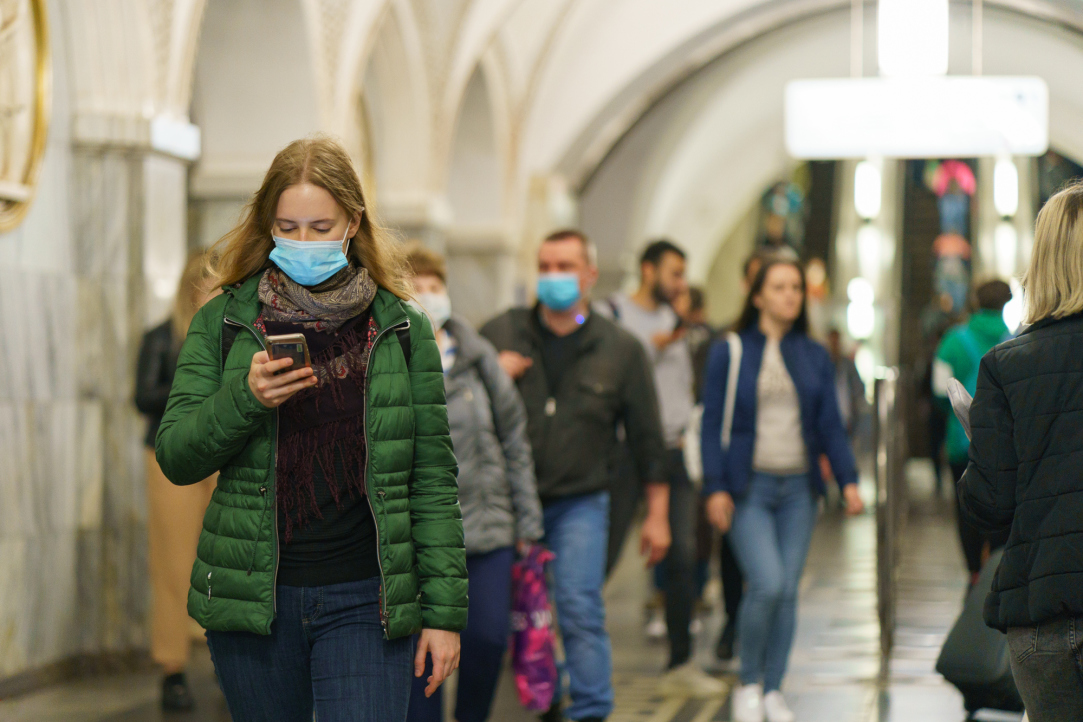How People’s Behaviour Has Changed in Public Places during the Pandemic

The HSE Centre for Fundamental Sociology has recently held ‘Logica Socialis’, an open social theory seminar. Andrei Korbut, Senior Research Fellow at the HSE Centre for Fundamental Sociology, presented his report entitled ‘COVID-19 as an interactional phenomenon: People’s behaviour in public places during the pandemic’.
The seventh meeting of the open social theory seminar Logica Socialis took place at the Centre for Fundamental Sociology of HSE University. It was devoted to changes in people’s behaviour in public places during the coronavirus pandemic. The Centre’s Senior Research Fellow Andrei Korbut presented his research. He began his talk by saying that COVID has affected various spheres of people’s lives and, in the opinion of many speakers, these changes will leave their mark on the future.
‘Some aspects of our ‘façade’, or as Irving Hoffman calls it ‘front’, have undeniably changed, as well as our interaction with other people in public spaces. This is primarily due to both the character of the disease itself and the measures that have been taken because of the pandemic,’ the speaker believes.

Andrei Korbut, Candidate of Sociological Sciences, Senior Lecturer of the School of Sociology, the Faculty of Social Sciences, and Senior Research Fellow at the Centre for Fundamental Sociology, HSE University’
COVID has affected many, but not all, aspects of everyday life. Here, we should take into account the features of different spaces. In the underground, the influence of COVID is transformed considerably or interpreted through the ordinary practices of people’s behaviour in this public place. On the one hand, the influence of the expected supervision [over compliance with anti-virus requirements] should not be overestimated. On the other hand, we should not underestimate that fact that people follow these requirements. They are aware of what is happening and understand that these requirements may be used not only by the authorities, but also by other people who assess their moral status. The way we behave in this public place is assessed from this respect as well, and we should take it into account.
The research by Andrei Korbut and his colleagues relies on observations made in the Moscow underground since the beginning of spring 2020. The speaker explained that he looks into people’s behaviour within the context of three dimensions—space, time, and interaction with acquaintances and strangers. For instance, the researcher believes that the way people slow their pace before entering the underground, putting on their masks right in front of the entrance doors, clearly shows that people’s attitude to space has changed.
‘Social space is structured differently in the time of COVID. On top of new tangible objects (like masks and gloves) and new rules for physical distancing, our behaviour has changed, including the way we approach the doors to an underground station. We’ve developed a new series of actions. This is no longer the simple act of opening the door and stepping inside. We need to get ready for doing this by putting on gloves and masks, then we need some space and time to actually perform the action,’ said the speaker.
Andrei Korbut also noted the changes in the behaviour of couples. Most often, they both wear (or sometimes not) masks, rearranging or lowering their masks to mirror their partner’s behaviour. ‘I think this cannot be explained solely by the fact that couples are supposed to be equal. Equality does play a certain part, of course, but there are some procedures whereby people achieve this equality. In my opinion, it is very noticeable that couples, on the one hand, mirror each other’s behaviour and, on the other hand, teach each other how to use masks and gloves. Thus, we can see how people control each other’s behaviour.’
Andrei Korbut
See also:
HSE Biologists Explain Mechanism behind Coronavirus Evolution
A team of researchers, including scientists of the HSE Faculty of Biology and Biotechnology, have analysed the evolutionary path of the coronavirus from the Wuhan variant to Omicron. Their findings indicate that many genomic mutations in SARS-CoV-2 are shaped by processes occurring in the intestines and lungs, where the virus acquires the ability to evade the inhibitory effects of microRNA molecules. The study findings have been published in the Journal of Medical Virology.
Russian Researchers Explain Origins of Dangerous Coronavirus Variants
HSE researchers, in collaboration with their colleagues from Skoltech and the Central Research Institute for Epidemiology, have uncovered the mechanisms behind the emergence of new and dangerous coronavirus variants, such as Alpha, Delta, Omicron, and others. They have discovered that the likelihood of a substitution occurring at a specific site of the SARS-CoV-2 genome is dependent on concordant substitutions occurring at other sites. This explains why new and more contagious variants of the virus can emerge unexpectedly and differ significantly from those that were previously circulating. The study’s findings have been published in eLife.
HSE Biologists Prepare Strategy for Universal COVID Test
Russian researchers have developed a strategy to create a cheap and rapid COVID-19 test based on isothermal amplification. According to their publication in Applied Biochemistry and Microbiology, use of this strategy will make it possible to create universal test systems for any of the COVID-19 variants.
People’s Values Affect Their Attitudes to COVID-19 Restrictions
HSE social and political analysts have established which value models and circumstances promote support for restrictive government policies aimed at combatting the coronavirus pandemic. The research is published in Plos One.
Model of Predator-Prey Relationship Helps Predict Spread of COVID-19
Researchers from the HSE Faculty of Economic Sciences have proposed a mathematical model that describes the course of the COVID-19 pandemic, taking into account the restrictions applied in different countries. The model will help governments make reasonable and timely decisions on introducing or lifting restrictions. The paper was published in Eurasian Economic Review.
HSE University Classes to Be Held On Site for All Students
Classes in the new academic year will take place on site for students of all HSE University campuses. Existing COVID safety precautions will remain in effect.
Russian Scientists Investigate the Immune Response to SARS-CoV-2 Variants
HSE University researchers assessed the effectiveness of the T-cell immune response to 11 variants of SARS-CoV-2. Their findings have been published in Nucleic Acids Research.
First-year Students Will Be Able to Get COVID Shots at HSE University
The new regulations ‘On the Organization of Studies for the 2021/2022 Academic Year’ feature in detail what will change for first-year students in the new academic year. HSE University will be organizing a vaccination drive in September for students aged 18 and over who are unvaccinated. Younger students will be eligible for vaccination once they turn 18.
New Safety Measures to Be Introduced at HSE University
Starting September 1, 2021, HSE University-Moscow is introducing new safety policies on campus to prevent the spread of COVID-19. They apply to students over 18 years old who have not had COVID during the last six months, have not been vaccinated (with a Russian or a foreign vaccine), nor have a medical exemption from vaccination. Free vaccination will be available on campus to all arriving students.
HSE University Creates the Viral Genealogy Simulator to Model the Spread of COVID-19
Researchers of HSE Tikhonov Moscow Institute of Electronics and Mathematics (MIEM), in cooperation with their colleagues from the University of California, Santa Cruz (UCSC), and The European Bioinformatics Institute (EMBL-EBI), have developed software to model the spread of the COVID-19 global pandemic. This is the world’s fastest Viral Genealogy Simulator (VGsim). For more details about this scalable simulator, read the reprint on medRxiv. The code is freely available at GitHub.


